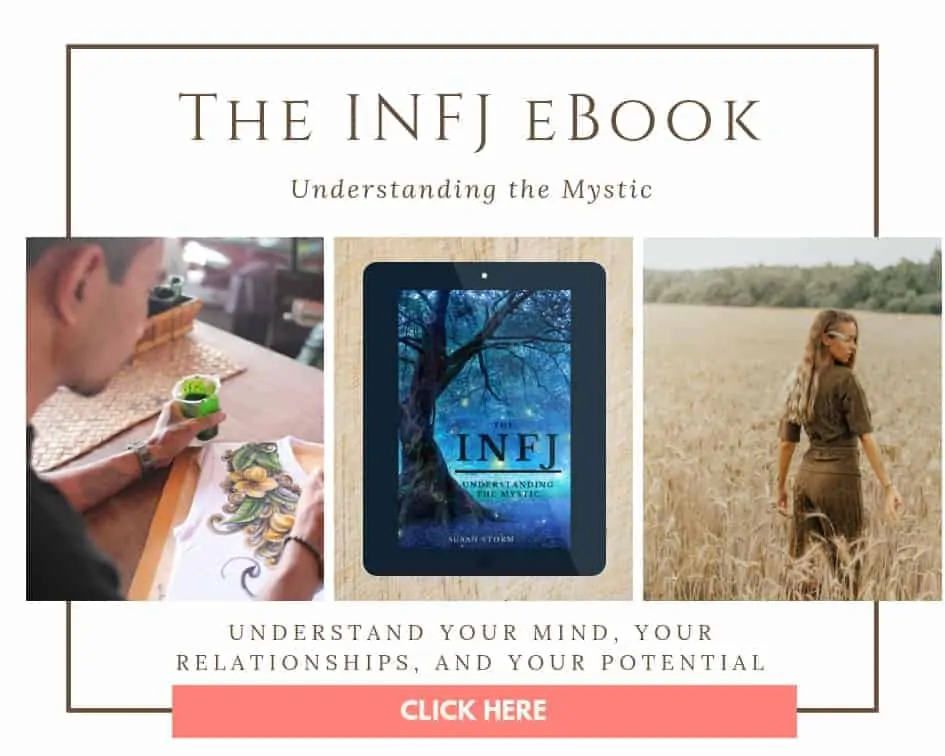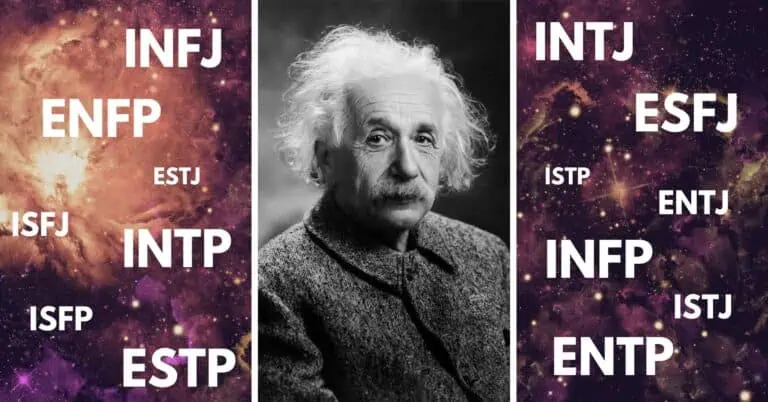Why INFJs Feel “Weird”
INFJs often get the uncanny feeling that they are strange or out of place in the world around them. While they may flood typology forums or Facebook groups, they are less likely to be seen in day-to-day life. As one of the rarest personality types, they have a difficult time meeting someone like them in their careers, families, or other social groups. INFJs carry a burden few others will ever share. They often feel like they don’t fit in, can’t be “seen,” or aren’t accepted as they truly are.
But why?

Estimated reading time: 7 minutes
Why do INFJs Feel Weird?
Yesterday I had the privilege of talking to my friend, Joyce Meng, a fellow MBTI® practitioner (and an INFJ as well). Both of us have spent years coaching and typing people from all walks of life. And over and over again when we speak to INFJs we are met with the same response: “Now that I know about my type, I finally don’t feel so weird.”
Intuitive Weirdness
Some of that feeling of “strangeness” comes from being an Introverted Intuitive type. INFJs live and function best in the world of Introverted Intuition, or “Ni” for short. Ni is a mental process that focuses on spotting patterns, hidden meanings, and overarching themes. INFJs have an abstract, futuristic approach to the world around them. Rather than seeing things for what they are, they see things for what they “mean.” When forced to focus all their attention outside the intuitive plane, they can come across as stressed, unsteady, or overwhelmed. Unfortunately, the world often requires this of INFJs (and their INTJ type-siblings).
“You have to come to this social event!”
“Pay attention to what you’re doing!”
“Focus on the facts”
“Get out of your head!”
“Stop over-complicating things”
These phrases are likely ones most INFJs have heard one or many times in their lives. It’s as if the world wants INFJs to behave more like their sensing or extroverted friends and co-workers. To be fully “present” and aware of the details around one’s self is considered the goal. Many INFJs have to work hard to stay in the moment, to stay reactive to the world around them, and to match the energy that other people direct their way.
INFJs are expected to “get with the program.” When they inadvertently slip into their intuitive world, they are often judged as being aloof, disengaged, or even rude. They may be accused of not caring about or listening to what others have said. The truth is usually far different. Usually they’re deeply invested in what people are saying, but they’re naturally going to read into those words and look for meanings, patterns, and insights. This can mean that they may look lost in a world of thought and not as reactive as people want them to be.
When Predicting Goes Wrong
INFJs naturally look for associations and connections to identify patterns and to see everything around them as an interconnected web of meaning. In short, INFJs are natural pattern-seers. The connections that they see are often hard to verbalize in a way that others will understand. Often others see their intuitions as “leaps” of logic that make no sense. But what people don’t see is the amount of time INFJs spend gathering patterns, and looking at the complex world “behind the curtain.” It makes sense – it’s just hard for them to explain.
Not everything INFJs have predictions about will be easy to verbalize. They may just know certain outcomes without knowing why they know them. The information is there. They’re not necessarily making a “leap,” but they don’t know how to organize their evidence or information in a linear way. They may not be able to tell people “this is what will happen,” but they’ll know something isn’t right or feels off. INFJs report feeling stressed when they try to articulate their intuition in a logical, sequential format.
The intuitions of the INFJ can make other people skeptical and put-off. Retorts such as “that doesn’t make any sense” or “you don’t have any proof of that!” are frustrating because usually even INFJs know that they aren’t explaining their insights as well as they want to.
While some personality types have neatly organized minds with organized shelves of information, INFJs tend to have minds that are more like landscapes filled with symbols, images, and webs of connections lighting up here and there. Nothing is organized in a sequential way (usually) and when they find a connection or insight they may not always have all the data perfectly lined up so that they can explain themselves.
The Extraverted Feeling “Mask”
Other than intuition, INFJs are deeply in touch with a mental process called Extraverted Feeling (“Fe”). This process focuses on maintaining harmony and respecting the cultural and societal values of the people around them. INFJs spend a lot of their time trying to figure out how they can be agreeable and get along with other people. They may slip into this process at times when they’re feeling pressured by the outside world. They want to make sure that everyone gets along, that there’s agreement, and that everyone’s needs are met.
At a young age, many INFJs learn that their Intuition is met with skepticism and confusion rather than acceptance and encouragement. Thus, they turn to their second-strongest function, Extraverted Feeling. This function is met with praise, smiles, and support most of the time. After all, from an outside perspective, Feeling tends to look like warmth, empathy, and consideration. It’s primarily focused on people and relationships and understanding interpersonal dynamics. People tend to gravitate to this side of the INFJ, and this can give young INFJs a glimmer of hope of finding their place in the world.
It’s Not Enough
While Extraverted Feeling is a major part of the INFJ personality type, it’s not their dominant mental process. They aren’t ENFJs or ESFJs, and they can only operate in an extroverted way for so long before they burn out. Introverted Intuition and Extraverted Feeling can work together, and often do, but some people will squint skeptically when the intuitive side of the INFJ seeps out in their words.
Many INFJs recall that they’ve never felt “seen” (in fact, this came up in my conversation with Joyce). This is often because they have to rely so heavily on their Feeling side, camouflaging their intuitive side with a feeling or sensing “mask” in order to avoid feelings of rejection.
It’s mostly in the quiet and tranquility of solitude that INFJs can truly access their intuition fully. It’s crucial for them to get regular time alone to sink into their own mind and let their imagination come fully alive. INFJs need time to daydream, fantasize, and immerse themselves in their inner worlds. In the quiet, their mind becomes a lush and endless wonderland full of rich insights, mythical symbols, and otherworldly lands that are only for their mind’s eyes to perceive. Without introverted intuition fully operational, they begin to feel restless, anxious, and unable to stay present.
It’s Time to Take Off the Mask
INFJs who have had their intuition nourished and encouraged throughout life learn to believe in their goals, dreams, and insights. Their intuition becomes stronger, more powerful, and more accurate. When you meet these INFJs they have a confidence in what they believe and can be charismatic leaders towards a better future.
Maybe this isn’t you and hasn’t been your experience. What can you do then?
I encourage you to be the first person to accept and love yourself for who you truly are. You are worth acknowledgment and your insights matter to the world.
Take time to practice your intuition. You can check out my article: 10 Intuition Hacks for INFJs and INTJs. You can also join my Intuitive-Feelers Facebook group as a way to connect with other INFJs (and INFPs, ENFPs, and ENFJs). But the next time your intuitions are met with a quizzical look or skepticism, try to stay with your intuition anyway. Sure, your insight or idea could be off-the-mark, but it could also be right on-point. Politely stay who you are and don’t let the skeptics get you down.
It’s also crucial to make sure you’re getting plenty of time in solitude and explore your inner world. And when you do need to go out into the world, find friends who appreciate you for your true self and not just for the friendly exterior. INFJs like you have a lot to offer the world.
Don’t dim your light because some people think you’re “weird.” Own your weirdness, accept it, and learn what it has to teach you!
What Are Your Thoughts?
Did you enjoy this article? Share your thoughts with other readers in the comments! Discover much more about your personality type in my eBook, The INFJ – Understanding the Mystic.









Some points of this article apply to INTJs like me as well. Sometimes when reading the INFJ articles you’ve written, I feel like I have an INFJ side of me because the two types are so similar. So, I’d love to see an article like this written for INTJs.
Great article! The constant dismissal and outright rejection of insights is hard to accept in a world filled with perpetual lies. No one knows what to do with me, so to keep peace, I keep my mouth shut. I seem to be the burster of bubbles, and worst person to talk to at a gathering, which is ironic when most of what I do is simply ask questions. It’s interesting to me how many would rather live in ignorance than have an honest discussion about their own insights and the world. It has left me lost most of my life because every direction I go I encounter haters and skeptics. I know these insights hold some validity because I have had terrific growth and success in many aspects of life when implemented individually. However when it comes to fitting in with society and any cultural norms, it is a lonely path that is my soul burden to bare. I believe on a deeper level I have chosen this path, so I own it. If people want to learn and grow they will seek it out. If not they will toil with their own internal conflicts and they will eventually learn from them or they won’t. Most people don’t want to change and exploring uncomfortable perspectives and truth, which we enjoy, are most certainly not welcome. Tis a gift and a curse, but wouldn’t have it any other way. Thank you.
100 percent describes me and my entire life! Insightful, thank you.
Can completely relate! To every single thing described here. Trying to own my own weirdness and not go 100% into extroverted feeling all the time, loosing myself and my intuition. I still struggle with not feeling seen and feeling off, different. Internally, when Im just with myself, I dont feel weird, wrong or anything like that – I know my value and worth. But sometimes/often when Im out among other people and when Im in the very extraverted and sensing-dominant culture, it is harder for me not to go into the “Im wrong, weird, off”-feelings. And especially my non-lineaer way of thinking puts me in some awkward/difficult situations sometimes and I get some strange looks from people who dont se what it is Im getting at. Getting better at owning my weirdness, internally and externally!! Thanks for a great and detailed article!
Here is a love letter from an ENFP…
INFJs, you are so weird. You’re always here to tell us that there’s a different way for things to be, that life is so much more than what we already know. The world needs you so much. Nothing is more precious than this beautiful weirdness of yours. Thank you very much. Keep shining!
Warm hugs <3
This really lightened my day, thanks. And I hope someday my parents appreciate my weirdness as well.
Thanks, Susan for sharing your knowledge with us! I’m learning to embrace my ‘weird’. Recently I feel a little ‘mad.’ You’re always spot on and validating. I’m working on listening skills. Suggestions, please?
This was such a great article for me to “accidently” discover! I’ve seen two-line descriptions throughout my life, but never anything this detailed. I feel better already.
Best one yet. Keep them coming
Lean into your weirdness, accept it, and love it. Such a wonderful sentiment. Always a work in progress, always trying to do and be better! Thanks!
Thanks so much for articulating how I’ve felt for so long. I’m lucky that in my social circle I’ve found some great friends who accept this intuitive side of me, and in a way, supported me to know when to elaborate and when not to.
In my work life, it has not been easy. What bothers me most is I have rarely, if EVER, had someone simply say to me:
“I hadn’t thought of it in that way…do you mind please elaborating/explaining what you mean?”
That’s what I would do!
But unfortunately I get judged (ie. “get with the program”) as someone with their head in the clouds. But in reality this can’t be further from the truth…I’ve already thought about the wider implications and take that into account.
I think part of our problem stems from being peacekeepers desiring harmony. This makes it feel completely wrong to just stubbornly hammer home a point of view, leaving us vulnerable to others who are more than happy to do this….in a professional sense.
My various jobs have gone one of three ways:
a) Speak up, be misunderstood, and end up getting squeezed out
b) Follow along with the guidelines and keep my mouth shut until I get disillusioned by fatal issues within a system and leave
c) Do it my way, until someone views this as not being a team player, and end up getting squeezed out and/or disillusioned by the inefficiency of it all
I’m currently working on perfecting the way I, a) follow along to start with, before b) speaking up with confidence once established, while c) doing minor things my own way while waiting for change just stay sane, while d) talking the talk with others to keep up my social status.
It’s exhausting!
This post describes me 100%
Infj here….this was spot on. Sometimes infj descriptions feel all wrong to me. But this one, mainly the explanations of my inner world and difficulty expressing what I know inside, were just right. Feeling understood ❤️
An insightful and comforting article Susan . It still feels awkward to me, even in my old age, this feeling of being a “force of nature” and the effort involved in observing but resisting tribal
expectations of “getting with some program.” In all the walks of life. I do find Sanctury in solitude and when “Participation” is required, I find it best practiced through keeping it simple (KISS) , believable, effective and verifiable for the recipient’s welfare and mine. I am grateful to have survived long enough to find the right balance between both states, that results in a great sense of contentment.